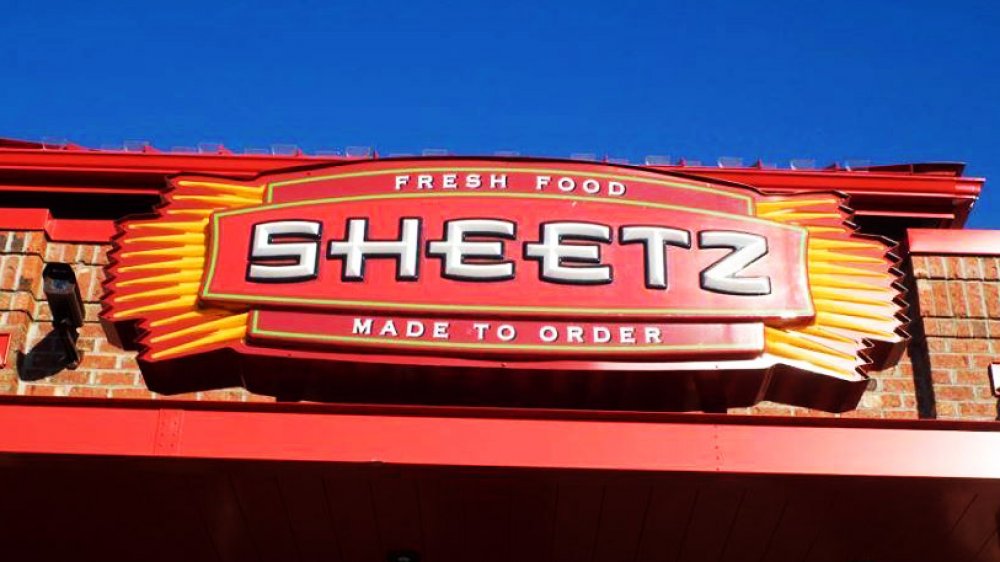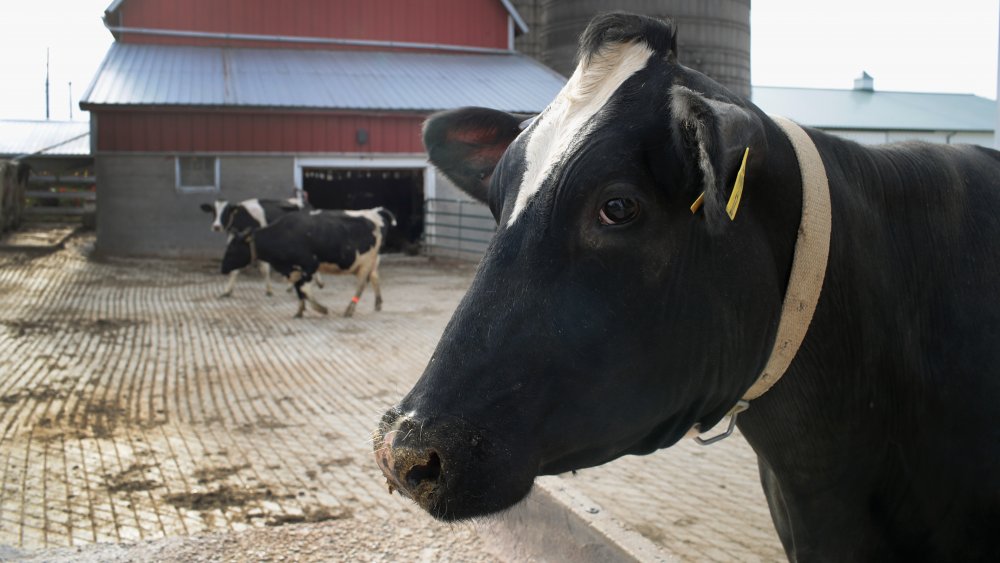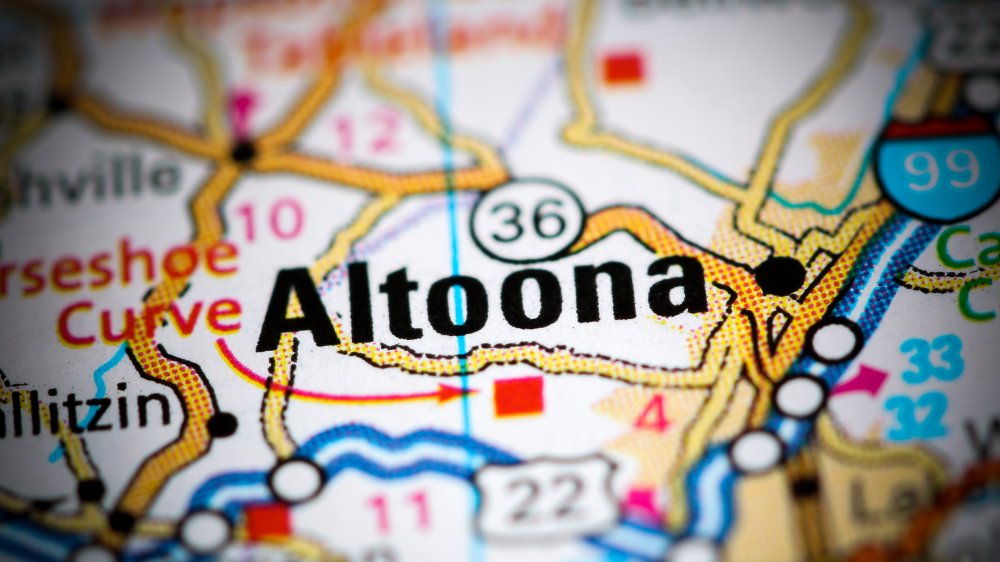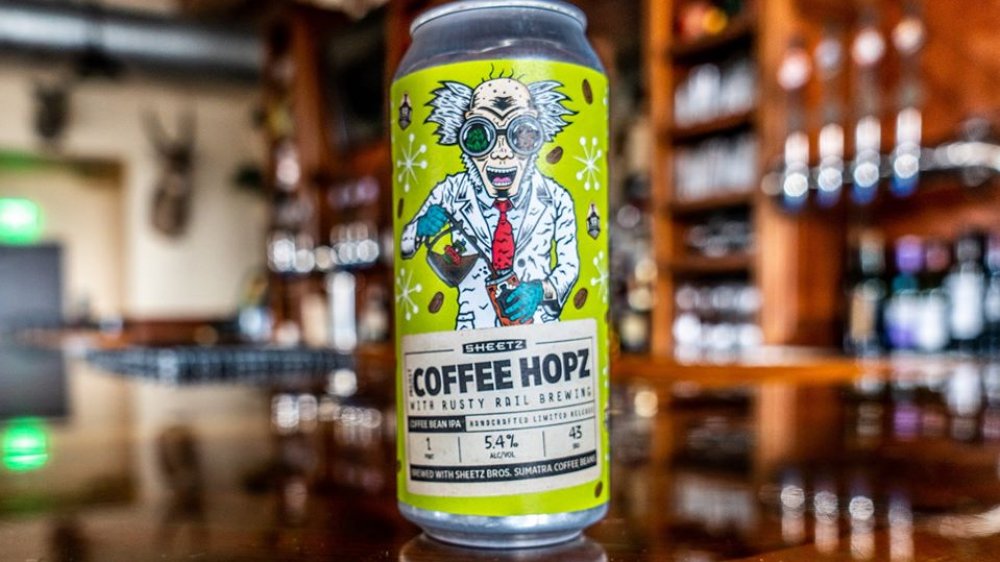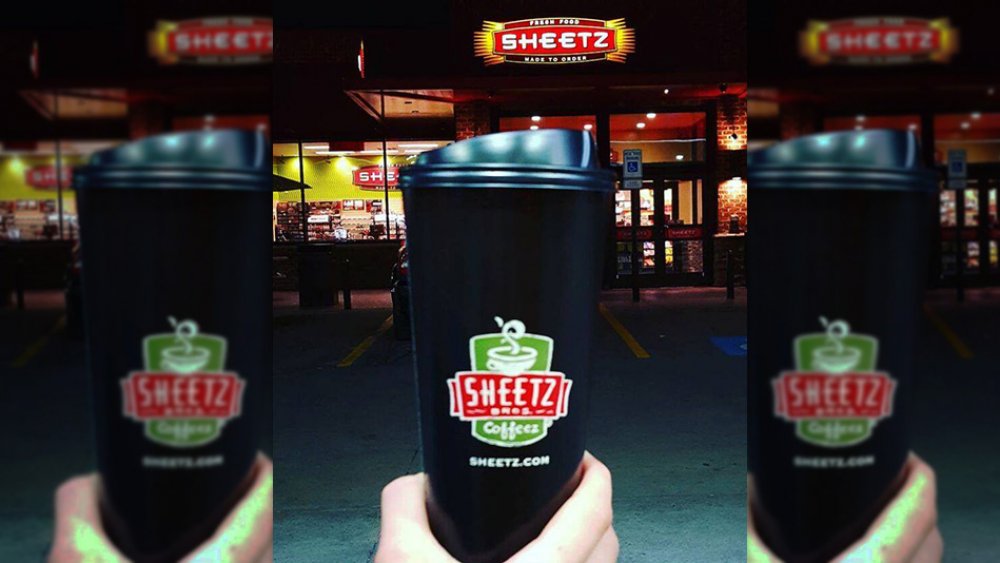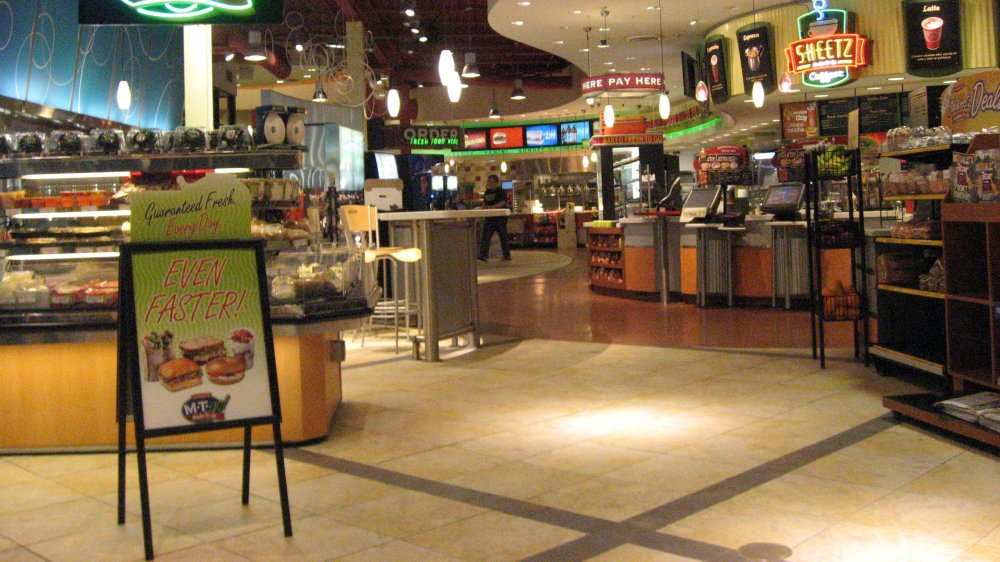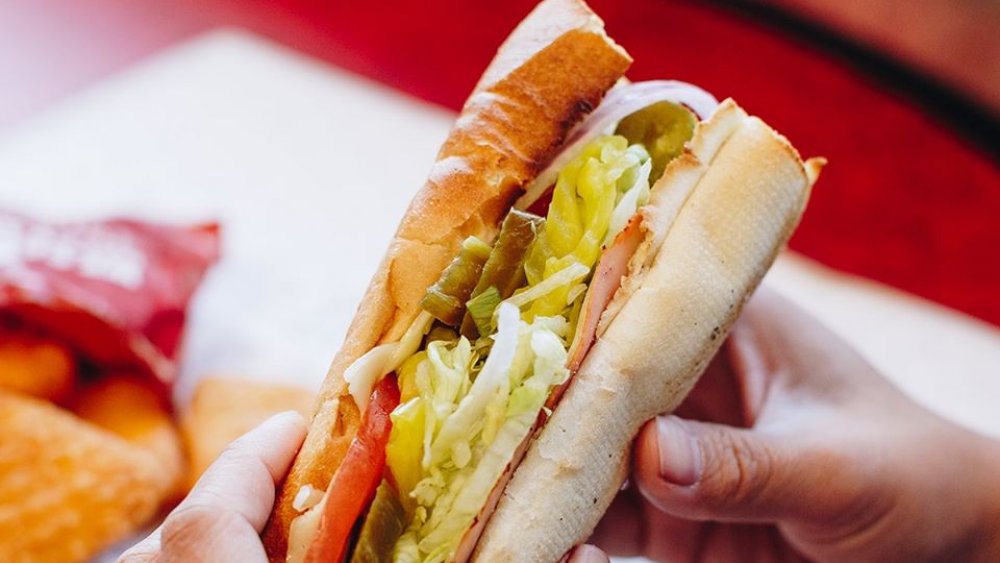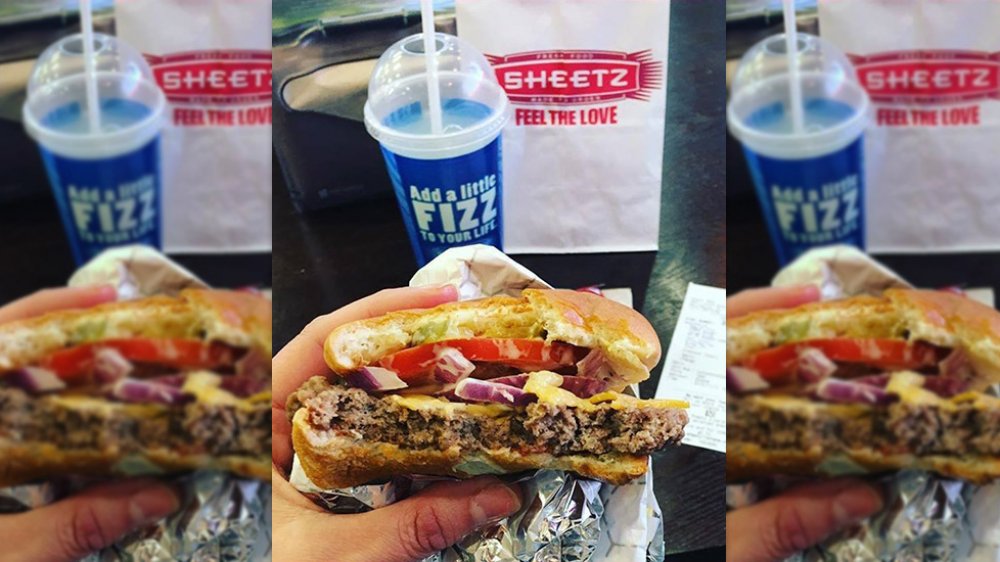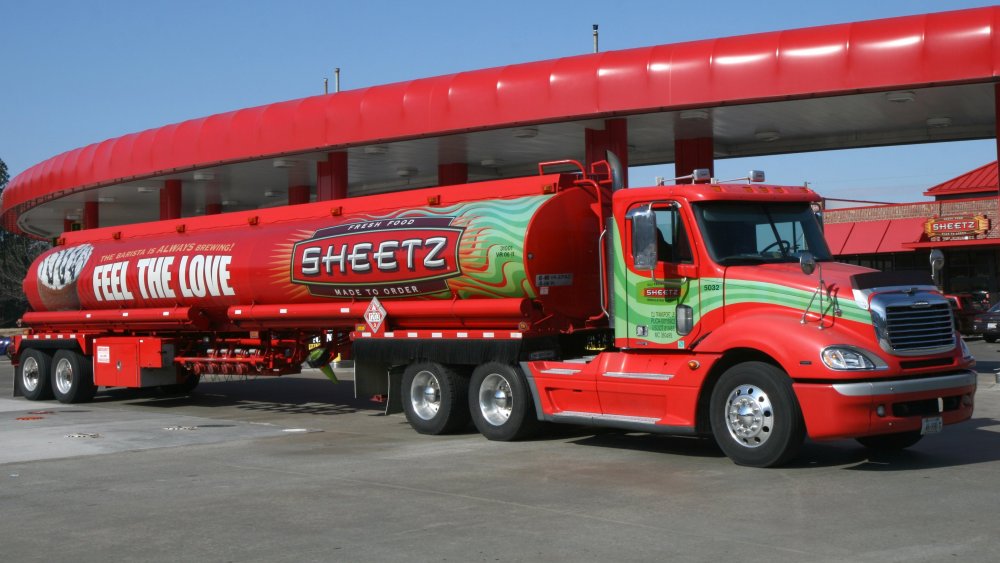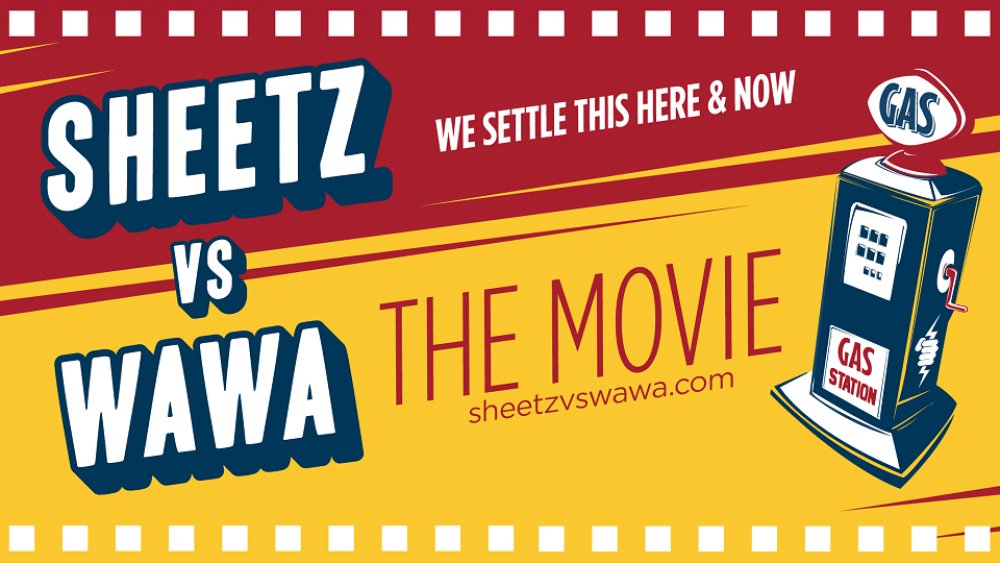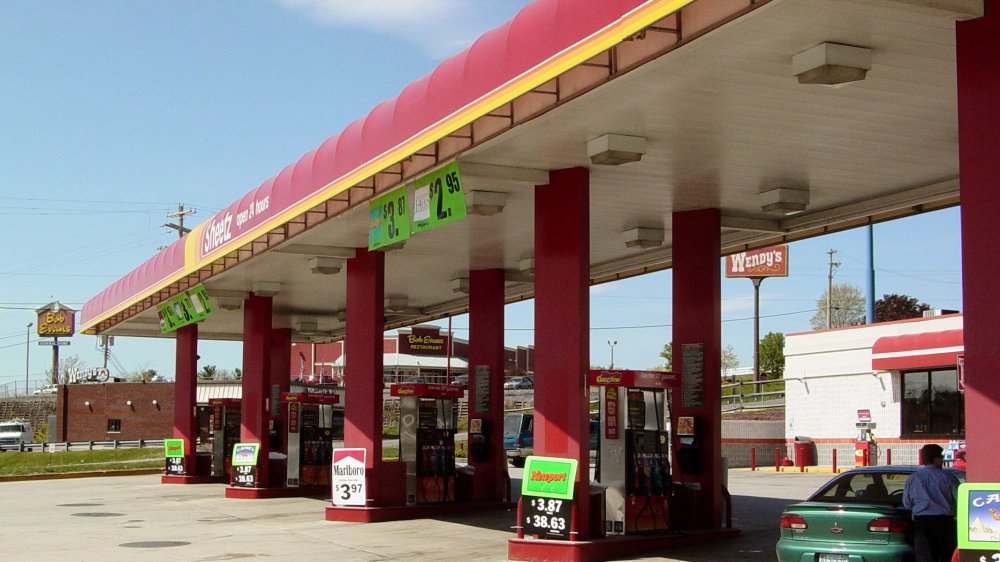The Untold Truth Of Sheetz
Anyone outside of most mid-Eastcoast states might find it odd that a gas station could be a popular destination for meals, but that's only because they haven't experienced the magic of a late-night Sheetz run. What began as a small convenience store in the small town of Altoona, Pennsylvania, has become a large chain and Sheetz now boasts over 600 locations across PA, Ohio, West Virginia, Maryland, Virginia, and North Carolina.
Sheetz is known for its quirky branding, often placing "sh" and "z" at the beginning and end of its original products; sandwich melts are called shmeltz, muffins are shmuffins, and so on. Beyond that, the family-owned company has helped innovate the convenience store industry, transforming the way consumers think about how much a merger between fast food and gas stations actually makes a lot of sense.
But there's much more to Sheetz than its zany branding and fierce regional loyalty. The company has nearly 70 years of history that tells the story of its vast growth.
Sheetz started as a small chain of dairy stores
In 1952, Bob Sheetz purchased one of the five dairy stores his father owned in Altoona, founding Sheetz Inc. Nine years later, Bob hired his brother Steve to work part-time at the convenience store. And in 1963, the pair opened a second store under the newly named "Sheetz Kwik Shopper."
The third store followed a few years later, along with the plan to reach seven stores by 1972 at a rate of opening a new store every year. Instead, the brothers doubled their goal, opening 14 stores by that point. A year later, Sheetz was one of the first companies to bring self-serve gasoline to central Pennsylvania after installing gas pumps at its stores.
And the innovation would only continue through the years, as the brothers opened over 100 stores by 1983. And though leadership would change hands between the brothers, the pair continued to put an emphasis on remaining a family-owned and operated business as it continued to grow.
Sheetz pioneered touch-screen food menus
These days it's fairly common to find touch screen menus pretty much anywhere; from super markets and fast food chains to the local bodega and corner coffee shop. But 25 years ago, that sort of concept felt more science fiction than reality. Especially at gas station convenience stores.
But in 1993, Sheetz installed a touch-screen menu for custom orders at the deli counter of one of its Altoona locations. And by 1996, the unique kiosks were installed in every Sheetz location. The technology helped Sheetz to roll out its signature MTO (Made-To-Order) menu concept, removing the need to take custom food orders, one customer at a time, and opening the door for the type of 24/7 food service usually reserved for roadside diners.
If you've ever used the system, you know how easy it is to order custom menu items, continue shopping while it's being prepared, then pay for everything all at once. It really puts the convenience in convenience stores.
Its hometown has grown from the Sheetz influence
Though Sheetz has expanded far from its smalltown, homegrown roots to over 600 locations across six states, it's hard to ignore the impact the company has had on the town of Altoona, and Pennsylvania in general.
As President and CEO Joe Sheetz told NPR in 2017, speaking from his company's headquarters in Altoona: "I don't think we're the reason Blair County is a great place to live but I'd like to think the jobs we've been able to create, particularly the jobs in the last 15 years, [are] not only well-paying jobs but lots of career opportunities that we've been able to provide people in this geography," said Joe Sheetz, referencing the county where Altoona is located.
That same year, Sheetz was ranked as the 83rd best employer in the country by Forbes magazine. These days Sheetz employs over 17,000 people, with over half living and working in Pennsylvania, offering benefits like tuition reimbursement and an employee stock ownership program.
Sheetz has teamed up with microbreweries for limited edition beer collaborations
Since legislation changes in the last few years finally give Pennsylvania grocery and convenience stores the opportunity to sell beer and wine, it only makes sense that a franchise like Sheetz would capitalize. Especially with the abundance of craft breweries throughout Pennsylvania.
In 2019, Sheetz unveiled its first craft beer collaboration, a limited edition coffee-based IPA aptly called Project Coffee Hopz (see, we weren't lying about the constant "z!") with central-Pennsylvania based Rusty Rail Brewing Company in Mifflinburg. After the success of project Coffee Hopz, Sheetz partnered with Philadelphia's Evil Genius Brewing on Project Brewberry Muffinz, a blonde ale brewed using, you guessed it, the convenience stores' in-house blueberry muffins.
And again in May 2020, just in time for Memorial Day Weekend, Sheetz teamed up with Neshaminy Creek Brewing Co. (based in Croydon, PA) for Project Hop Dog—another IPA, this time made with Sheetz Hot Dogz. Don't worry if that doesn't sound appealing, the inclusion of hot dogs in the brewing process was more novelty than an actual recipe. "The beer does not taste like hot dogs," Jason Ranck, Neshaminy's head brewer, told Food & Wine. "We thought it was just a fun concept and the perfect beer for pairing with Sheetz Hot Dogz and warm weather activities."
Sheetz coffee is unmatched in the industry
If the concept of a hot dog beer doesn't sound like your cup of tea, you can skip the tea altogether for Sheetz Bros. signature coffee. It's hard to think of a more traditional convenience store beverage anyways, and Sheetz has made it a point to distinguish itself as a place to find gourmet coffee at a fraction of the price. In 2012, the company double-downed on its efforts, investing $7.5 million in a coffee brewing system (the Soft Heat by BUNN) that promised to retain heat and aroma in a more efficient way, without sacrificing taste or risking any burning.
Additionally, Sheetz continues to add new blends to its impressive assortment of freshly grounded beans as well as seventeen creamer and flavor options and a full line of latte and mocha beverages, claiming customers can customize their coffees in over 1,000 different ways. With constant innovation to their coffee grinders and brewing systems, it's only natural that a change would come to the type of coffee cup the company uses as well. In a statement released in 2015, Ryan Sheetz, Director of Brand Strategy explained that "The updated cups are fully recyclable, BPA-free and made out of #5 polypropylene – one of the safest materials used to package foods," he said. "This implementation will divert approximately 2,300,000 cups from landfills every year."
The unique Sheetz branding extends beyond its stores
As you may have noticed from some of the food and beverage items included in this list, Sheetz is pretty fond of implementing its "sh" and "z" branding across all of its original creations. But the trend has also extended beyond in-store branding to the many community efforts the Sheetz family has undertaken. In 2002, the Sheetz Family Wellness Center was constructed in Altoona for various student health services as well as housing Penn State Altoona's nursing program. The facility is nicknamed the "Shwellness" Center, and includes services like routine medical care, women's health services, STD testing, allergy and immunization clinics, outreach programming, disability services, as well as counseling and psychological services.
There's also the company charity initiative, Sheetz for the Kidz, which began in 1992 as a way to give directly to the community through holiday toy and clothing drives, while also hosting in-person parties. In 2005, the charity expanded to Make-A-Wish partnerships, granting 55 wishes and sponsoring the vacations for families of seriously ill children. Since its inception, Sheetz for the Kidz has served over 129,000 children throughout the communities Sheetz is a part of.
Sheetz invented MTOs and pioneered new technology
What exactly is in a name? It's hard to downplay the effect Sheetz has had on the gas station convenience store model, even just in its conception of MTO (made-to-order) foods. There was certainly a stigma to ordering "real" food at a gas station, and to some extent there still is. Think about microwave burritos, hot dogs spinning for months under old heat lamps, or whatever it is that comes out of a push-button machine that calls itself nacho cheese. But now, it's not far-fetched for convenience stores to boast robust menus full of fresh ingredients.
The real change and innovation started when Sheetz took the concept of custom sub and sandwich shops and implemented the same model into their convenience stores, starting as early as the mid-1980s. It was mostly the simple idea of delivering exactly what customers wanted, when they wanted it, allowing for more customization and a higher-quality product. The MTO completely changed how every Sheetz location operated and is a staple in the business today.
Sheetz is a Penn State branch campus partner
Sheetz has partnered with Penn State Altoona's campus in multiple ways, well beyond the Sheetz Family Wellness Center. Steve and Nancy Sheetz gifted the Sheetz Center for Entrepreneurial Excellence to Penn State Altoona's downtown area in 2011. The facility offers students and community members a modern space to learn and develop business ideas. The incubator space includes conference rooms, private workstations and state-of-the-art technology to give entrepreneurs and young businesses the tools to network and grow. The center also hosts an annual business plan competition where students take their ideas from conception to fully-fleshed out plans. The winners receive a financial reward to grow their plan as well as the necessary infrastructure and resources to give it a chance to actually succeed.
The Sheetz Fellows Program was also established at Penn State Altoona to give those students who go above and beyond normal educational achievement an even greater opportunity to develop their skills in real-world settings. Membership includes scholarship support, mentorship programs, study-abroad opportunities, and more for those students chosen as fellows. Though Sheetz is now a massive franchise, the company does all it can to remain connected to the hometown general store feel.
Sheetz was the first U.S. convenience store to offer Beyond Burgers
A gas station is probably the last place anyone would expect to have vegan-friendly options, but add this to the growing list of Sheetz firsts. Starting in December of 2019, Sheetz made the plant-based Beyond Burger available across its then-597 locations. The partnership with Beyond Meat is the first of its kind in the convenience store industry. The burger starts at $6.99 retail, with the usual Sheetz MTO customizations available. The Sheetz Beyond Burger offers a 100 percent plant-based meat option for customers. But it promises similar texture and taste as a traditional beef burger.
"Sheetz is constantly innovating and adding new menu items to give our customers what they want, when they want it, 24/7," said Dan Coffin, lead chef and AVP of Culinary Development at Sheetz in a statement from the company. "As demand for healthier, diverse protein options increases, we are excited to add the Beyond Burger to our menu in our continual mission to be the ultimate one-stop-shop." Considering all the bad gas station food out there, this is a refreshing option.
Sheetz is one of the largest retailers of E15 fuel
In an era where brands are more environmentally conscious than ever before, it might be even more surprising that a gas station would be near the top of its industry in offering sustainable solutions for the future. But Sheetz is at it again in its commitment to offering E15 fuel to its customers since 2015. Granted, Sheetz was aided by the Prime the Pump initiative in its early adoption of E15, but it's still a grand gesture by a large gasoline retail company. According to the Iowa Renewable Fuels Associaton, E15 (15 percent ethanol, 85 percent gasoline) is a high-quality, high octane fuel that burns cleaner and performs better, as long as a given vehicle is approved for use. Most models beyond 2001 are fine.
E15 typically has an octane rating of 88, but costs less than regular unleaded gasoline. This means retailers have a lower-priced fuel to advertise across their signage (which means more MTOs!). However, it's mostly a win-win scenario. Sheetz gets the opportunity to offer consumers more value while attracting a higher volume of traffic in general, at little to no investment cost. Additionally, they get to be industry leaders once again.
Sheetz and rival Wawa were the center of a planned documentary
It's hard to mention Sheetz without also mentioning rival Wawa, a massively popular convenience store that operates on a similar model to Sheetz and in many of the same areas. Today, Wawas can be found in Pennsylvania, New Jersey, Delaware, Maryland, Virginia, Washington, D.C., and Florida, and is the the largest convenience store chain in Greater Philadelphia. For many Pennsylvanians, the Wawa vs Sheetz debate is as fierce as any brand rivalries (think McDonald's vs Burger King, Nike vs Adidas, etc.). And while both businesses have mostly contributed similarly positive experiences to the communities they're established in, the "feud" is certainly fascinating in how it relates to Pennsylvania culture as a whole.
So much so that PA native filmmaker Matthew Fridg set out to settle the debate with his planned documentary, Sheetz Vs Wawa. Fridg is an Emmy-nominated filmmaker whose work has appeared in productions for the Discovery Channel, Facebook, and the NFL, was inspired to dig into exactly how and why two convenience stores mean so much to so many people across the state. A Kickstarter began in 2019 for the project, which is still in development.
Sheetz is dropping gas pumps altogether in some areas
There was a time when gas pumps were a new addition to the Sheetz convenience store model. Since their implementation, it's difficult to not think of Sheetz as the gas station with a high-quality fast food option. But with the popularity of its MTO menu, expansive coffee options, and general convenience store offerings, it's surprising Sheetz hasn't moved to more pumpless locations in general. Starting around 2015, that idea became a major focus for the company in an effort to expand to more urban areas and college towns. It's a move that further cements Sheetz as more of a fast food restaurant than a gas station convenience store.
In a 2015 interview with TribLIVE, Dave Woodley, the company's executive vice president of sales and marketing, mentioned why distinguishing the Sheetz brand beyond gas was important: "The channels have been blurring for quite some time, from the convenience store industry to the (quick-service restaurant) industry to the fast-casual industry," he said. "So as we move into, and have been growing our food and beverage business, that becomes more and more important to us."
